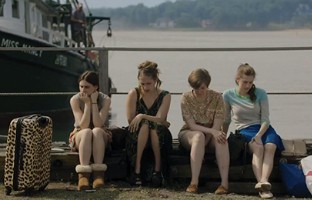What girls want

"I don’t want to freak you out, but I think I may be the voice of my generation,” says Hannah Horvath (Lena Dunham) to her parents in the first episode of HBO’s comedy Girls. The line is funny for a number of reasons. It’s funny because her claim is part of Hannah’s plea for her parents to support her financially for several more years so that she can write a book. It’s funny because that plea comes from a woman who is falling apart at her parents’ feet. It’s funny because it’s unabashedly egocentric. But it is not only funny; it might also be true.
Girls continues to get a lot of attention as a boundary-breaking comedy focused explicitly on gender. That attention comes in part from young adult viewers who recognize something of themselves in Hannah and her friends—Marnie, Jessa and Shoshanna—and in what HBO calls “a comic look at the assorted humiliations and rare triumphs of a group of girls in their mid-twenties.” Girls has gained two Golden Globes and an Emmy. Dunham—who is writer, producer, director and actress in the series—is smart and fearless.
Read our latest issue or browse back issues.
But Hannah and friends are not navigating adult life very well. They get into an endless number of painful, embarrassing situations. The show is full of explicit and unpleasant sexual encounters.
Sex is depicted in various unflattering lights: as violent, impersonal, obligatory, humiliating. The characters bring the twisted scripts of pornography into their lives in ways they are rarely capable of reflecting on. Hannah, a writer, seeks varied experiences with sex so that she can write about them. Jessa uses sex for power. Beautiful Marnie struggles to figure out what it might mean to be more than just a pretty girl, and Shoshanna sees her virginity as shameful. One man walks away from her because virgins “get attached.” When Hannah is diagnosed with a sexually transmitted disease, she tries to accept Jessa’s judgment that this is just something that happens to “all adventurous women.”
Sex in Girls has very little to do with romance or even with pleasure. It’s a required experience, something to check off the to-do list.
Hannah and friends are somewhat insulated from their self-destructive behaviors by layers of race and class privilege. They’re reasonably wealthy and attractive white girls, able to assume that there is a safety net under them if they indulge in a cocaine-driven fantasy or quit a job. The show is aware of this reality. Characters who don’t have the benefit of this protection point this fact out to Hannah. Her not-middle-class neighbor Laird tells Hannah that she is “the most self-involved, presumptuous person I’ve ever met.”
A brief relationship between white Hannah and black Sandy (Donald Glover) ends with a hard-to-watch but funny scene in which Hannah makes a ridiculous profession of color blindness. She looks into Sandy’s face and claims not to see color when she looks at him. The show has been criticized for failing to deal well with diversity, but in this episode Dunham points to just how poorly a group of privileged young white women deal with race. The result is thought-provoking and honest.
Girls is a tragedy pretending to be a comedy. If Hannah is the voice of her generation, then the church had better sit up and take notice. Girls shows a generation hungry for meaning, for purpose, for vocation, and it reveals a generation lost. As the show begins its third season, I suspect that viewers will want to see the characters fail less and reach for the good life more.
In an episode that explores a fantasy for Hannah—what her life might be like with an attractive, stable man—she reveals her secret truth. “Please don’t tell anyone this, but I want to be happy.” To find true happiness, though, the Hannahs of this generation need something that takes them beyond the self-involved world of Girls.






